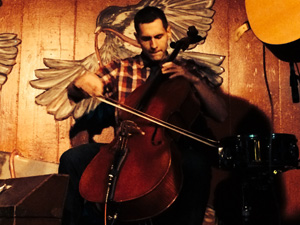Dig a bit deeper into music with some basic history, theory, and music appreciation knowledge. Discover the science that your ears and brain wire together and call music. View all
 Hey everybody, allow me introduce myself before we get going. I’m Kent Heberling, life-long musician and first-time contributor to this site. I have an extensive music background including over a decade of cello, guitar, bass, percussion and piano performance, a pretty regular gig schedule with 3 local bands, and a B.F.A. in Music Composition & Technology. I’ll be writing about everything, because everything is what I like.
Hey everybody, allow me introduce myself before we get going. I’m Kent Heberling, life-long musician and first-time contributor to this site. I have an extensive music background including over a decade of cello, guitar, bass, percussion and piano performance, a pretty regular gig schedule with 3 local bands, and a B.F.A. in Music Composition & Technology. I’ll be writing about everything, because everything is what I like.
Do you Dig It?
You went to a show. You heard a tune. Did you enjoy it? Why? Did you hate it? Why? Should you have liked it even if you didn’t? Oh, and the most important question, was it good?
First, let’s understand there’s a huge difference between acknowledging music as good, and enjoying it. Enjoying music is completely subjective, based on your personal preferences and sentiments, while the quality of music should be viewed objectively. It’s tough to disassociate the two, but learning to do so can really open your eyes to a lot of great things.
The Questions to Ask
I really only ask three questions to determine whether music is good or not:
Doest it have an objective? Music should serve some sort of purpose, whether it’s to make you question societal morals, test your patience with droning tones and silence, or just get you in the mood for a cheap beer. Different people could come up with different objectives, but you shouldn’t be left wondering “why did they even write this?”
Does it achieve its objective? Did the song hit its mark? If you think the musicians were trying to push tonal boundaries, did you find yourself amazed by the chord progressions and harmonies? If the song was trying to be a feel-good hit of the summer, did you feel good?
Is the objective a good one? Ok, I admit it, this is a bit subjective, but it’s necessary. It’s up to you how preachy to be about this, but try to be open and fair. The only objectives I don’t value are ones that promote some sort of extreme negativity; no songs promoting racism, misogyny, extreme commercialism, or anything like that.
Some Examples
Has an objective/ Achieves it / Good objective: A cheesy pop song written for party music? Sure! A complex metal song written to push rhythmical boundaries? Hell yes! A banjo song about relaxing with whiskey? Please do. A vibrator thrown into an opened piano to make you think about randomness in composition? Delightful.
Has an objective / Does not achieve objective / Good objective: Doom metal song written to be the heaviest thing ever that just rehashes Sabbath licks at a slower speed? Not as apocalyptic as you’d hoped. An ambient soundscape that contains choppy transitions? Revise and resubmit.
Has an objective / Achieves it / Bad objective White power metal? Absolutely not. Country song about waking up in the driver’s seat in the middle of a field after drunk driving? Please no.
Final Thoughts
You’ll never enjoy everything you hear, but if you start asking yourself about the quality of music as objectively as you can, pretty soon you’ll notice your subjective enjoyment of various styles expanding. Get out there, soak it all in, and learn to love it. Dig?

